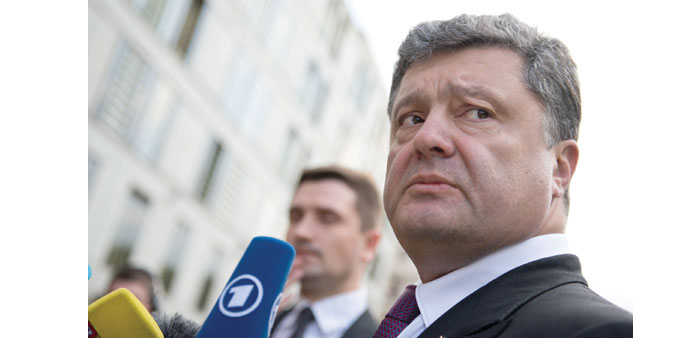AFP
|
|
Ukraine launched delicate dual-track diplomatic negotiations with Russia yesterday, aimed at averting a debilitating gas cut and ending a bloody separatist insurgency by the end of the week.
The meetings in Brussels and Kiev throw down an immediate challenge to new Ukrainian President Petro Poroshenko’s European commitment and vow to preserve the territorial integrity of the splintered former Soviet state.
The 48-year-old confectionery tycoon and political veteran promised late on Sunday to end fighting “this week” in Ukraine’s economically vital eastern rustbelt that has claimed more than 200 lives.
And he affirmed after being sworn in as Ukraine’s fifth president on Saturday that Kiev would sign a historic pact with the European Union that would finally wrest it out of Russia’s orbit.
But the eight-week insurgency that Kiev and the West accuse Russia of orchestrating rages unabated.
Ukrainian defence sources told AFP that militants had staged a wave of failed attacks on the international airport in the Russian border city of Luhansk (also spelled Lugansk) after briefly seizing its counterpart in neighbouring Donetsk late last month.
Intense artillery fire and air bombardments also continued in the rebel Donetsk region stronghold of Sloviansk (also spelled Slavyansk and Slaviansk) – an industrial city of 120,000 where many have been sheltering in basements for weeks.
The Ukrainian army also said pro-Russian gunmen had taken several of its soldiers prisoner overnight.
“Some were out in the field, but others were abducted,” military spokesman Vladyslav Seleznyov wrote in a Facebook post. “We are still learning the details of everything that happened.”
The EU-mediated gas talks in Brussels come on the eve of a Russian deadline for Ukraine to cover a debt of nearly $4.4bn (3.2bn euros) or have its shipments end tomorrow.
About 15% of Europe’s gas from Russia transits through Ukraine – a dependence that EU nations have been trying to limit ever since suffering similar disruptions in 2006 and 2009.
But analysts said that the fuel freeze would also deal a bruising blow to a Ukrainian economy that the International Monetary Fund (IMF) already expects to contract by 5% this year.
Ukraine has refused to pay the bills in protest at Russia’s decision to nearly double its neighbour’s rates in the wake of the February ouster of Kiev’s Kremlin-backed president.
Sources said the pressure on all sides to agree greatly boosted the chances of a compromise.
“There is a high likelihood that this really will be the final meeting at which we expect to agree on a schedule of payments for the already delivered gas,” a Russian source close to the negotiations told Moscow’s Vedomosti business daily.
An unnamed Ukrainian official said he expected Kiev’s Naftogaz state energy holding to make an immediate payment of $1.0bn (730mn euros) for gas it received in the last two months of last year.
“Another $451mn may be paid in the near future,” the Ukrainian source told the daily. “And for April and May, we expect an initial payment of $500mn.”
Moscow’s VTB Capital investment bank said the price for future deliveries would probably hover around $360 per thousand cubic metres of gas – a sum about halfway between Russia’s old price and the one set after the rise to power of the new pro-Western authorities.
Poroshenko conceded upon taking the oath of office that the eastern uprising could not be resolved without the direct involvement of Russia.
The two sides conducted the first of what the Ukrainian leader said should be daily negotiations on Sunday involving a representative from the Organisation for Security and Co-operation in Europe (OSCE) – a Vienna-based body that was first tasked with securing peace during the Cold War.
Poroshenko affirmed after that meeting that “we must end the fighting this week”.
Ukraine’s acting Defence Minister Mykhailo Koval said yesterday that Poroshenko’s peace push “instills great hope that wise steps will be taken shortly that let the residents of eastern Ukraine live in peace”.
But the president’s pledge was dismissed as political grandstanding by separatists who have taken effective control of a dozen towns and cities and are now seeking a formal invitation to join Russia.
“We are continuing to mobilise, preparing volunteers for the defence of Donetsk,” the region’s self-proclaimed deputy premier Andriy Purgin told Russia’s Interfax news agency.
And Poroshenko himself did not spell out how he intended to make gunmen comply with the ceasefire or whether he would order a full military withdrawal.
Some analysts said the hurdles facing Poroshenko’s presidency were too daunting to quickly surmount.
“Ukraine’s new president has inherited considerable political and economic problems, which are more likely to worsen than improve in 2014,” said Chris Weafer of Moscow’s Macro Advisory consultancy.

